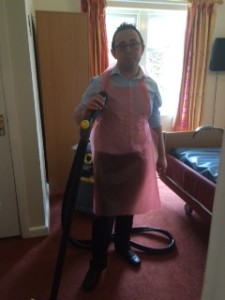EBN are delighted to share their latest blog on the important topic of infection control in care homes. This blog coincides with an innovative “Infection Prevention and Control CPD Link Day” which is taking place today, Thursday 17th September 2015, for care home staff in Northern Ireland with specialist input from Rose Gallagher, RCN UK National Infection Control Advisor. The organiser of the event, Gary Cousins, provides us with an overview in this guest blog.
Gary Cousins (@Cousins_Gary) is Infection Control & Clinical Development Nurse for Four Seasons Healthcare in Northern Ireland, Wales and the Isle of Man. A new position in Four Seasons and the first of its kind with the company UK wide. Gary has been developing the role, educational programmes and support systems to empower staff and facilitate greater ownership of day to day practice in relation to infection control. Gary’s link programme within Four Seasons earned recognition at the Nursing Times Awards 2014 earning the runner up spot in the IPC category.
When I started in IPC (infection prevention and control) 3 years ago there was no internal educational programme for IPC link staff. In addition there was no criteria for taking on the link role nor definition of what the role should be. In essence any staff who had been identified as IPC links were names on paper who attended an external education session every once in a while. External sessions were non-mandatory so care homes had no obligation to facilitate staff attendance.
Dawson (2003) said that, IPC link staff can play an important role in their clinical area to facilitate liaison with the infection control team and to act as a resource for colleagues.
With this in mind I thought “how can the link role be developed so that it is meaningful, how can staff be provided with education relevant to the environment they work in and can a system be created which allows staff to easily access specialist support?” Then it hit me a mandatory internal link programme. It seemed simple, if only! There were things to consider;-
- Who would be invited to attend?
- Can criteria for taking on the link role be established?
- What topics are going to be covered?
- Can all the topics be covered in one day or are multiple days required?
- Where are the link days going to be held? Care homes under my remit are split into 9 regions based on geographical location.
And so the scoping began. I visited care homes to observe IPC related clinical practice, finding gaps in basic practices such as hand hygiene and use of PPE (personal protective equipment) amongst other things. When I reviewed the opportunities for hand hygiene or using PPE, these fell mainly to the non-nurses. Care staff were providing the majority of assistance with personal care/continence care. Domestic staff were moving from room to room looking after environmental cleanliness. This meant that these staff groups were in the best position to identify good practice, poor practice, cultural practice and potentially to influence a positive change in clinical practice. In contrast when reviewing the nurses role, they were responsible for planning care relating to residents who may have active or colonised healthcare associated infections (HAIs). To implement an appropriate and person centred plan of care the clinical knowledge of nurses is of fundamental importance.
Link staff are traditionally defined as practising nurses with an expressed interest in a speciality and a formal link to specialist team members (MacArthur, 1998). However, following my visits to Care Homes I decided that the role, needed to be expanded to include senior healthcare assistants and domestic supervisors. The rationale behind this expansion was very simple; if we want/expect there to be a high standard of IPC practices within care homes then those staff who have the potential to have the greatest influence in practice must be included. The only stipulation was that senior healthcare assistants or domestic supervisors taking on the role must also have a link nurse within their care home.
Following the scoping the plan to take forward a link programme was;-
- Every home with a nursing unit must send a nurse (but could also send a senior healthcare assistant and/or domestic supervisor).
- As this was a pilot, we had a very loose criteria for the link role – the main point was that the person must have an interest in IPC. Lack of interest equals lack of motivation and lack of motivation equals poor utilisation of the role.
- Based on observations in the homes and discussion with staff the topics needed to range from a definition of what the link role is, basic practices – standard precautions, environmental cleanliness, care of the person with MRSA living in a hare home, Clostridium Difficile awareness, seasonal Influenza and identification and management of gastroenteritis outbreaks.
- With the volume on the programme the topics were split into 3 separate sessions held at appropriately identified times throughout the calendar year.
- Each of the 9 regions received the 3 sessions so that meant delivering 27 link sessions throughout the year. No mean feat.
From the pilot programme in 2013-14 the programme was a great success, with approximately 80% of Homes represented. This coincided with a 61% reduction in outbreaks of infections such as gastroenteritis. The feedback was extremely positive so the programme was replicated for 2014-15. Again the results were positive with a link nurse, Shauna Rooney, winning the National Nursing Standard IPC Link person award in May ’15. This very much highlighted what can come from positive and effective implementation of the link role with the drastic improvement in basic and fundamental practices.
This month I have the opportunity to do something a bit different for the link staff. On the 17th September 2015 I am running an IPC CPD day for link staff. Whilst it is important to provide information for staff as the link programme has done in the past 2 years, focus on development of the role and further assessment of staff perception of the role is essential to driving improvement.
The focus of the day is effective use of the role and driving quality improvement in day to day practice. I have been lucky to have the involvement of Rose Gallagher from the Royal College of Nursing as part of the day. Rose is running a workshop called ‘build a link person’ which asks link staff to assess their capabilities and limitations in communicating with and influencing others. Other areas of the day will be ‘using clinical audits effectively- quality improvement versus quality assurance’ and ‘A Clostridium Difficile outbreak- what did we learn?’. The day can be followed on Twitter with the hashtag #FSHCNI, it promises to be a great day.
Gary Cousins, Infection Control and Clinical Development Nurse, Four Seasons Health Care

